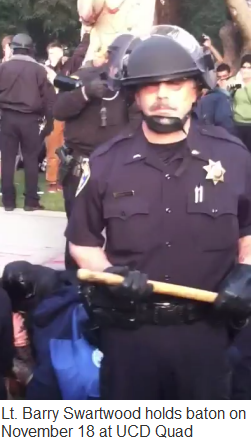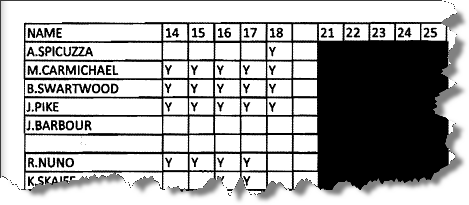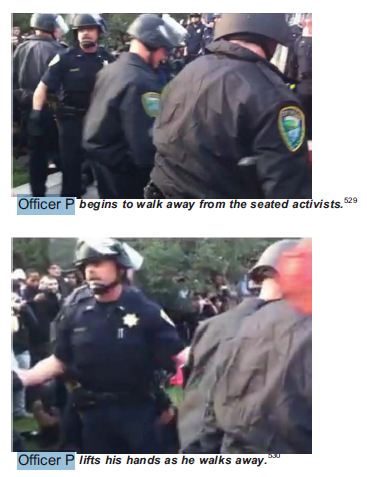 The Vanguard fundamentally disagrees with the decision to redact names in the Reynoso Task Force and Kroll Reports. We believe that responsibility needs to be taken appropriately by those whose decisions or actions contributed to this problem.
The Vanguard fundamentally disagrees with the decision to redact names in the Reynoso Task Force and Kroll Reports. We believe that responsibility needs to be taken appropriately by those whose decisions or actions contributed to this problem.
The identification is very obvious and, even without the duty roster, we could have figured it out. However, with the duty roster it is a no-brainer.
We know from the report that Officer P was a lieutenant and the Incident Commander. That makes identification fairly straightforward.
We can eliminate Lt. Carmichael, the new police chief, who was at the UCD Med Center in Sacramento. We know that Officer P is neither, then, Chief Annette Spicuzza, who was named, nor Lt. John Pike, who was also named.
We also know that Lt. Swartwood was recently promoted from Sgt. when Nader Oweis was hired as the new chief at UC Santa Cruz.

The task force singles out Lt. Swartwood as he “bears individual responsibility for abdicating his duties as incident commander.”
Kroll calls a “key flaw of the police operations plan prepared by [Swartwood] and Lt. Pike,” that it “failed to address prisoner transport.” Moreover, “The lack of timely decision-making by Lts. Pike and Swartwood to respond to this unplanned situation caused an escalation of an already volatile situation. “
Like Lt. Pike, Lt. Swartwood was critical of the plan. He and Chief Spicuzza “called Vice Chancellor Meyer to tell him that there would be too few police officers available to implement the plan on Friday morning.”
Moreover, “Pike and [Lt. Swartwood] made sure she knew the timing was a problem – voicing concerns about the operation’s timing from the moment they learned of the change to immediately before the operation began.”
Furthermore, like Lt. Pike, Lt. Swartwood expressed concern “over the legal basis for removing the tents.” It was he and Lt. Pike who contacted the Campus Counsel about “the legality of conducting a planned operation during the middle of the afternoon versus the early morning hours.”
 Lt. Swartwood insisted, along with Lt. Pike, “on wearing riot gear despite [Chief Spicuzza’s] contrary instructions.”
Lt. Swartwood insisted, along with Lt. Pike, “on wearing riot gear despite [Chief Spicuzza’s] contrary instructions.”
The report singles out Lt. Swartwood at a critical point, “Nominally at least,” Lt. Swartwood “was the designated Incident Commander for the Nov. 18 operation. As detailed above and by Kroll,” Lt. Swartwood “did not act ‘in the manner that [a] police commander should.’ “
Indeed, Kroll notes that neither Lts. Pike nor Swartwood behaved like supervisors in as much as Lt. Swartwood, “nominally the Incident Commander, was moving throughout the scene, confronting protesters, and leaving the area to meet the newly arrived Davis Police Department (“DPD”) reinforcements. In short, none of the three [Pike, Spicuzza, and Swartwood] performed in the manner that police commanders during such an incident should have conducted themselves.”
The task force continues, “He failed to follow basic ICS/SEMS [Incident Command System/Standardized Emergency Management System] protocol from planning the incident to commanding it, resulting in unclear operational parameters and an unclear command structure, both of which contributed to his inability to command the operation effectively. His involvement with taking down the tents precluded him from obtaining an overview of the entire operation, a prerequisite to making informed command decisions.”
It is worth noting that the report finds that neither Lt. Pike nor Lt. Swartwood were aware that Officer F was able to simply walk the prisoners out. Was that a function of his failure to obtain “an overview of the entire operation?” Perhaps.
The task force notes, “There is no evidence that [Officer F] communicated with the Incident Commander.” They add: “If Lts. Pike and [Swartwood] had been aware of Officer F’s success, they may have considered a different tactic.”
Like Lt. Pike, Lt. Swartwood did not interview with Kroll, but rather submitted a supplemental report on November 30.
Kroll hammers both Lt. Pike and Lt. Swartwood for rejecting tactical direction from Chief Spicuzza. Lt. Swartwood was involved in the “heated” discussion among the three, with Chief Spicuzza saying that “she didn’t want sticks, she didn’t want them going in with helmets, and both the Lieutenants chimed in at her at the same time basically saying … ‘We can’t tell another Mutual Aid agency not to protect themselves. These are the tools of the trade, they’re designed to protect us.’ “
Kroll continues, “At this time, Pike also ‘mentioned something about … pepper ball,’ and Spicuzza answered, ‘We don’t want to use any of that,’ and the lieutenants replied, ‘Of course, we don’t want to use any of it. They’re tools of the trade. They’re less lethal.’ “
According to Lt. Pike, he and Lt. Swartwood “persuaded Chief Spicuzza to allow the officers to carry their batons in their belts and to wear their ballistic/protective helmets, arguing that ‘the potential for our officers to encounter resistance passive and physical was already heightened by the deadline imposed by the Chancellor in her letter as well as the networking of the Occupiers and their use of social media.’ “
Deborah Hammond, the executive assistant to Chief Spicuzza, overheard a conversation between Chief Spicuzza and Lt. Swartwood “in which he told her, ‘We’ll be in formation, we’ll be wearing shields’ … and she was very upset. She asked, ‘Why do we need to be in formation?” He responded with something about ‘regulation or procedure.’ “
According to Lieutenant Pike’s Supplemental Narrative Report, he discussed the use of pepper spray with Lt. Swartwood and “considered other force options.”
However, “In the Supplement Narrative Report,” written by Lt. Swartwood, “he does not say that he discussed the use of pepper spray or any other less-than-lethal force with Pike.”
Kroll reports, “Video footage shows that approximately one minute before Pike obtained the pepper spray from another officer’s belt,” Lt. Swartwood “stepped through the encircled activists to the southeast without incident. The first mention of pepper spray,” by Lt. Swartwood “in his Supplemental Narrative Report is when ‘Lieutenant Pike displayed a can of police pepper spray’ to the crowd while was outside of the circle.”
In his narrative, he justified the use of pepper spray stating, “It was my belief that to step over the protesting occupiers with prisoners and weapons would be hazardous. The occupiers had collectively surrounded us and it was possible, if we did step over them, that they could attempt to free our prisoners (they chanted that they wanted them released) or attempt to grab us or our equipment.”
However, he was not aware that Officer F had accomplished this with minimal resistance, which Kroll believed may have caused them to “have opted to take a different tactical approach to the situation.”
Moreover, his words are somewhat at odds with his own actions, as the videos depict Lt. Swartwood “moving through the crowd – immediately behind the seated activists that are within minutes of being pepper sprayed – without using force and without being confronted by any violent reaction, and then returning with the four Davis PD officers and their supervisors who, again, part the crowd without using force.”
Lt. Swartwood’s action must be viewed as such. He was the incident commander. While he attempts to escape responsibility for the decision to use the pepper spray, it happened under his watch, and Lt. Pike claims to have discussed it with him.
Unlike Chief Spicuzza, it seems that Lt. Swartwood and Lt. Pike were relatively on the same page throughout the incident. It makes sense that they would have consulted together. Other than the actual use of pepper spray, which Lt. Pike used, it appears there is little difference throughout this incident between the actions of Lt. Pike and those of Lt. Barry Swartwood.
The internal review should be able to better determine whether Lt. Swartwood was involved in the decision to use the pepper spray.
—David M. Greenwald reporting

Thank you, David, for all your hard work on this.
[quote]According to Lt. Pike, he and Lt. Swartwood “persuaded Chief Spicuzza to allow the officers to carry their batons in their belts and to wear their ballistic/protective helmets, arguing that ‘the potential for our officers to encounter resistance passive and physical was already heightened by the deadline imposed by the Chancellor in her letter as well as the networking of the Occupiers and their use of social media.’ “[/quote]
So how much of this whole mess was due to the Chancellor’s determination of tactics, which was outside her field of expertise? Reynoso has made it clear from his actions after the fact that he is trying to protect Katehi. This is the problem with Monday morning quarterbacking that calls for “heads to roll”, when you really don’t know all the facts and were not present at all the discussions. Secondly, decisions were made on the fly, as the fluid situation developed. We cannot know what was going through the minds of the police on the ground and how they saw things. Clearly mistakes were made by all concerned (including students). I personally would opt to allow the university to change its policies, do its internal investigations, and determine discipline, before making judgments…
Elaine: Isn’t an internal investigation also Monday morning quarterbacking? Isn’t in fact, a trial tantamount to it as well?
That said I don’t think this is Monday Morning Quarterbacking. It’s an assessment of what went wrong and holding those accountable when they do. This is actually, keeping with the analogy, what every coach does on Monday morning, he watches the game film and promotes and demotes on that basis. Plus he tries to fix strategy.
I am uncomfortable with the idea that you don’t believe that discipline may not be warranted.
Moreover, I think the votes of confidence for Katehi were premature.
But more central to this article, I think that whatever discipline that Lt. Pike receives ought to be comparable for Lt. Swartwood as it appears he was the one in command and agreed to the use of pepper spray. The only difference between the two appears to be Lt. Pike actually used the spray.
AND WHEN was he promoted?
The pix with the baton is chilling given the events of that day.
Again, I would think if the Chancellor was truly serious about changing the dysfunctional UCD PD, they would choose an outsider who has not been involved in the dept whether he/she was on duty the day of the incident or not.
[quote]Elaine: Isn’t an internal investigation also Monday morning quarterbacking? Isn’t in fact, a trial tantamount to it as well? [/quote]
Monday morning quarterbacking connotes hindsight by non-experts. That is the difference…
From: [url]http://www.merriam-webster.com/dictionary/monday-morning quarterback[/url]
[quote]Origin of MONDAY-MORNING QUARTERBACK
from a fan’s usually critical rehashing of the weekend football game strategy
First Known Use: 1932[/quote]
[quote]I am uncomfortable with the idea that you don’t believe that discipline may not be warranted. [/quote]
Never said that. I just don’t want to be the one to decide whether discipline should be handed out or not bc I don’t feel I know enough about police procedure and the inner workings of the university to pass judgment…
Am I mistaken, or does it seem that the original plan was to go in ready for trouble, but just go in to take down the empty tents?
And then somehow, for some reason, on the spur of the moment certain officers decided to expand the situation and arrest students.
If arrests were not part of the original planning and expectation, that would explain why there was no plan for transport of arrestees.
It might also explain, though not excuse, the lack of coordination.
What a mess ~
In my opinion, goal #1 is to put rules/procedures in place to avert a repeat of what happened in November; goal # 2 would be to make sure administrators and PD are trained in goal # 1; goal # 3 is to weigh anyone’s “stupids” against total service; goal # 666, look for folks to punish at the demotional/dismissal level, unless they can’t heart fully sign on to goals 1 – 3. But that is just my opinion.
hpierce
I find myself in agreement with your priorities and opinion. I do not see how anyone stands to benefit from “punishment” in this situation.
The only exception I might consider would be demotion or reassignment if one or more of the officers had a demonstrated pattern of use of excessive force in which case this might be the tipping point in having him removed from duty involving public contact. Perhaps a desk job would be a more appropriate assignment for a police officer unable or unwilling to work within the command structure and rules pertaining to his position. I don’t see the destruction of anyone’s life as a desirable outcome here.
[quote]I find myself in agreement with your priorities and opinion. I do not see how anyone stands to benefit from “punishment” in this situation.
The only exception I might consider would be demotion or reassignment if one or more of the officers had a demonstrated pattern of use of excessive force in which case this might be the tipping point in having him removed from duty involving public contact. Perhaps a desk job would be a more appropriate assignment for a police officer unable or unwilling to work within the command structure and rules pertaining to his position. I don’t see the destruction of anyone’s life as a desirable outcome here.[/quote]
Nicely said!